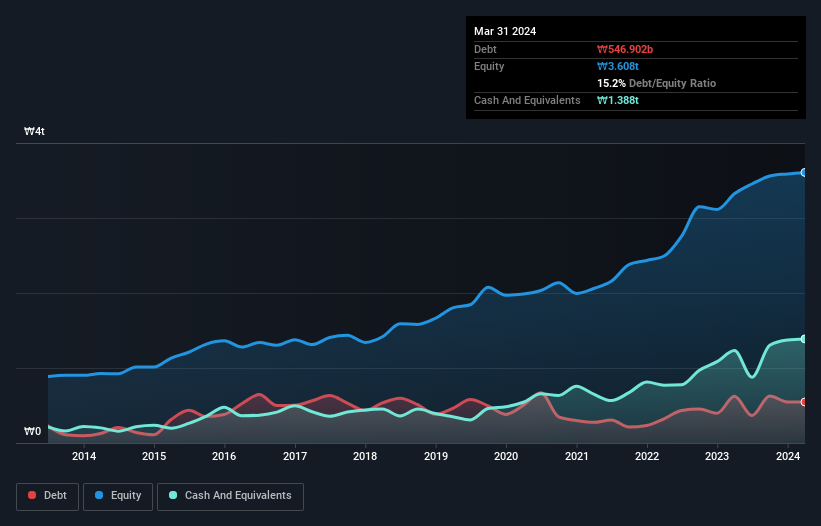Legendary fund manager Li Lu (who Charlie Munger backed) once said, 'The biggest investment risk is not the volatility of prices, but whether you will suffer a permanent loss of capital.' So it might be obvious that you need to consider debt, when you think about how risky any given stock is, because too much debt can sink a company. Importantly, Youngone Corporation (KRX:111770) does carry debt. But should shareholders be worried about its use of debt?
What Risk Does Debt Bring?
Debt assists a business until the business has trouble paying it off, either with new capital or with free cash flow. If things get really bad, the lenders can take control of the business. However, a more usual (but still expensive) situation is where a company must dilute shareholders at a cheap share price simply to get debt under control. By replacing dilution, though, debt can be an extremely good tool for businesses that need capital to invest in growth at high rates of return. When we think about a company's use of debt, we first look at cash and debt together.
View our latest analysis for Youngone
What Is Youngone's Net Debt?
As you can see below, Youngone had ₩546.9b of debt at March 2024, down from ₩623.0b a year prior. But it also has ₩1.39t in cash to offset that, meaning it has ₩841.1b net cash.

How Strong Is Youngone's Balance Sheet?
According to the last reported balance sheet, Youngone had liabilities of ₩1.12t due within 12 months, and liabilities of ₩592.2b due beyond 12 months. Offsetting these obligations, it had cash of ₩1.39t as well as receivables valued at ₩503.7b due within 12 months. So it can boast ₩177.3b more liquid assets than total liabilities.
This surplus suggests that Youngone has a conservative balance sheet, and could probably eliminate its debt without much difficulty. Simply put, the fact that Youngone has more cash than debt is arguably a good indication that it can manage its debt safely.
The modesty of its debt load may become crucial for Youngone if management cannot prevent a repeat of the 36% cut to EBIT over the last year. Falling earnings (if the trend continues) could eventually make even modest debt quite risky. The balance sheet is clearly the area to focus on when you are analysing debt. But ultimately the future profitability of the business will decide if Youngone can strengthen its balance sheet over time. So if you're focused on the future you can check out this free report showing analyst profit forecasts.
But our final consideration is also important, because a company cannot pay debt with paper profits; it needs cold hard cash. While Youngone has net cash on its balance sheet, it's still worth taking a look at its ability to convert earnings before interest and tax (EBIT) to free cash flow, to help us understand how quickly it is building (or eroding) that cash balance. In the last three years, Youngone's free cash flow amounted to 44% of its EBIT, less than we'd expect. That weak cash conversion makes it more difficult to handle indebtedness.
Summing Up
While we empathize with investors who find debt concerning, you should keep in mind that Youngone has net cash of ₩841.1b, as well as more liquid assets than liabilities. So we don't have any problem with Youngone's use of debt. There's no doubt that we learn most about debt from the balance sheet. However, not all investment risk resides within the balance sheet - far from it. For example Youngone has 2 warning signs (and 1 which shouldn't be ignored) we think you should know about.
Of course, if you're the type of investor who prefers buying stocks without the burden of debt, then don't hesitate to discover our exclusive list of net cash growth stocks, today.
New: Manage All Your Stock Portfolios in One Place
We've created the ultimate portfolio companion for stock investors, and it's free.
• Connect an unlimited number of Portfolios and see your total in one currency
• Be alerted to new Warning Signs or Risks via email or mobile
• Track the Fair Value of your stocks
Have feedback on this article? Concerned about the content? Get in touch with us directly. Alternatively, email editorial-team (at) simplywallst.com.
This article by Simply Wall St is general in nature. We provide commentary based on historical data and analyst forecasts only using an unbiased methodology and our articles are not intended to be financial advice. It does not constitute a recommendation to buy or sell any stock, and does not take account of your objectives, or your financial situation. We aim to bring you long-term focused analysis driven by fundamental data. Note that our analysis may not factor in the latest price-sensitive company announcements or qualitative material. Simply Wall St has no position in any stocks mentioned.
About KOSE:A111770
Youngone
Engages in the manufacture and sale of clothing, shoes, and supplies market worldwide.
Flawless balance sheet and undervalued.
Market Insights
Community Narratives




